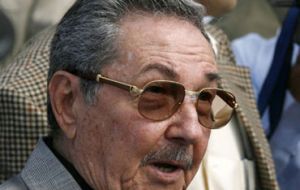MercoPress. South Atlantic News Agency
Cuba faces harder times; Castro willing to talk with US about everything
 Raul Castro again announced austerity faced with the island’s worst financial crisis since the 1990s.
Raul Castro again announced austerity faced with the island’s worst financial crisis since the 1990s. Cuban President Raul Castro said he remains ready to talk about everything and anything with the United States but that Cuba’s political system was not on the negotiating table.
Castro’s remarks came during a speech to the closing session of the Cuban parliament Saturday afternoon carried on national television when he also announced further belt-tightening as the economy continues to deteriorate.
He specified that discussion meant talking about issues in the US as well as in Cuba. After affirming that there have been no cases of torture in Cuba since rebel forces led by his older brother Fidel Castro drove Fulgencio Batista from power in 1959, he corrected himself to note that there had been torture in the US Guantanamo Naval base—still considered an integral part of Cuba by the Castro government—and that he was willing to discuss that with Secretary of State Hillary Clinton.
“I have to say, with all due respect to Mrs. Clinton ... they didn't elect me president to restore capitalism in Cuba, nor to hand over the revolution,” said Castro, who succeeded his brother Fidel Castro as president last year.
“I was elected to defend, maintain and continue perfecting socialism, not destroy it,” he added, prompting a long standing ovation from assembly members.
“We are ready to talk about everything, but ... not to negotiate our political and social system,” he said.
Castro also said that those who are reportedly waiting for the “biological solution” to the Cuba issue - the death of its aging leadership—were mistaken to think it would provoke changes in the country’s socialist system. Indeed he claimed, the younger generations were as committed as the revolution’s historic leaders to maintaining their socio-political system.
However, Castro noted at various points in his address that economic changes would have to be made to cope with the current crisis and those changes would include the elimination of the dual currency system imposed in the 1990s when the collapse of Cuba’s socialist allies brought the island’s economy to a virtual standstill.
Castro also said the government had cut its budget for the second time this year to confront the country's worst financial crisis since the 1990s. He did not say how much had been cut, but said the Cuban economy, battered by the global financial crisis and three hurricanes last year, grew just 0.8% in the first half of 2009. He said growth of 1.7% was expected for the full year.
The combined economic shocks cut income from exports and forced the government to spend more on imports of food and other items, which has depleted the country's cash. As a result, Castro said, “We've been forced to renegotiate debts, payments and other commitments with foreign entities
The plan for next year, he said, calls for Cuba to have a ”balance of payments, without deficit” and to put priority on producing products and services that bring hard currency.
The official newspaper Granma quoted Economy and Planning Minister Marino Murillo Jorge on Saturday as saying there would be more decentralization of the economy.
Castro's biggest reform since taking office has been the decentralization of decision-making in agriculture and putting more land in the hands of private farmers to increase food output. He also has pushed for Cubans to be paid based on their production, with the aim of creating incentives for them to work harder.




Top Comments
Disclaimer & comment rulesCommenting for this story is now closed.
If you have a Facebook account, become a fan and comment on our Facebook Page!